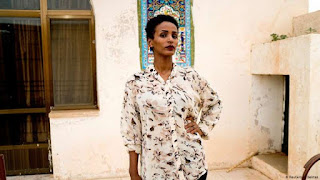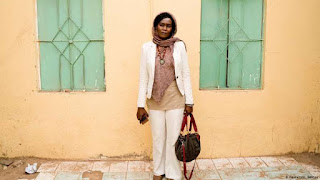Opinion Piece from ISS Today
Dated Tuesday, 06 August 2019
Sudan needs women at its negotiating table
Having played a leading role in Bashir’s ousting, women can improve prospects for mediation and long-term peace.
Sudanese women played a leading role in the pro-democracy movement that started in April and set their country on the long road to transition. Since the popular uprisings though, women’s participation in shaping Sudan’s political landscape has been limited. Their notable absence from negotiations to date is a missed opportunity to achieve lasting positive change.
Restoring power to civilian rule is proving difficult in Sudan. As the military continues to exert power over the population, civilians continue to protest. Non-violent resistance has been met with the butt of a rifle and women, in particular, have been targeted. Between April and June, 70 cases of rape and gang rape of protesters, female medical personnel and human rights defenders were reported, with over a dozen minors injured or killed.
By July, Sudan’s Transitional Military Council and the civilian Forces of Freedom and Change agreed on a preliminary power-sharing agreement aimed at transferring control to civilian rule. On 4 August the two groups agreed on a constitutional declaration that will ensure the formation of a transitional government. The formal signing will take place on 17 August. A three-year transitional period will be set up with a ruling body that comprises six civilians and five generals.
Political arrangements – like the one currently struggling for survival in Sudan – are not the end of a process but rather the beginning of building more accountable and transparent governance. They don’t guarantee stability or security on their own but are indicative of the type of society that will follow.
Including women in peace processes not only bridges divides between conflicting parties, but leads to better long-term outcomes. When women are involved, peace agreements are 35% more likely to last at least 15 years, and 64% less likely to fail. Women’s level of influence over a peace process is also associated with the likelihood that an agreement will be reached and that it will include gender-specific provisions.
Women aren’t considered key actors in peace processes because the focus tends to be short-term – ending the bloodshed – rather than the type of society and peace the negotiations will deliver.
Peace processes typically involve powerful men forgiving each other for the wrongs – including wrongs against women – they, or those they command, have committed, says Professor Cheryl Hendricks from the Africa Institute of South Africa. These men distribute power and access to resources among themselves, which serves to consolidate existing power structures.
Women bring a different voice to peace deals. Research shows that agreements with female signatories have more provisions for political, economic and social reform. When women are absent, peace deals tend to be more military-focused.
Considering the difficult transition Sudan will have to navigate to create a government based on human rights, it is essential that political, economic and social reforms are prioritised. And this is where women have a key role.
While the number of women represented during negotiations does not guarantee gender equality, including them gives their rights and interests a fighting chance. If gender priorities are not spelt out at the beginning, and strategically planned and budgeted for, they are unlikely to be recognised over time.
In the same vein, women’s inclusion during the pre-negotiation and negotiation phases paves the way for their inclusion in new institutions and during the implementation phase of the peace agreement. If women are not involved early on, chances are they will not be included in the later stages.
Mali is a case in point. The Algiers Agreement signed in 2015 offered little in terms of inclusivity. The peace process and its related bodies and mechanisms fall short of meeting the 30% quota for Malian women.
Four years later, the highest committee overseeing implementation, the Agreement Monitoring Committee, which is made up of 39 members from the government and signatory movements, is still composed entirely of men.
Sudan’s peace process provides an opportunity for its women to strengthen and consolidate women’s networks and help forge effective implementation strategies. In Liberia, such networks were instrumental in reviving political will for the disarmament process when it stalled.
Sudanese women should undertake mass action campaigns to push their way into official processes that currently exclude them. The push for inclusivity of women will have to come from civil society and political groups.
Three possible routes could be explored. One would allow an independent delegation of women to participate in the process. A second could involve formal consultative forums to identify key issues from women’s groups which are then communicated to negotiators. Finally, the 11 members of the new transitional government should at a minimum make provision for a quota for women’s representation which ensures women constitute at least 30%, as per international norms.
The collective role of Sudanese women’s organisations thus far has kept the international spotlight on human rights violations. They should continue to play a crucial role, especially in ensuring that the final agreement represents women and marginalised groups.
Monitoring the implementation of the political settlement – including of gender-specific provisions where they exist – is a key activity that local and international communities tend to overlook. In Sudan, women need to be closely involved in monitoring progress on the country’s peace deal.
Regional and international institutions must together exert pressure to ensure women play a meaningful and sustained role in Sudan’s negotiations once they resume. This requires procedures that explicitly allow women to influence decision making, rather than focusing on the numbers of women involved.
There are already woman champions who are the faces of positive transition in Sudan. In the interest of lasting stability, they need a place in the transitional government. DM
Liezelle Kumalo is a researcher and Cassie Roddy-Mullineaux, intern, Peace Operations and Peacebuilding, ISS Pretoria
The women of Sudan's protests
(Provided by Deutsche Welle)
The Returnee
The Activist
The Adviser
The silent fighter
The self-determined student
The Optimist







